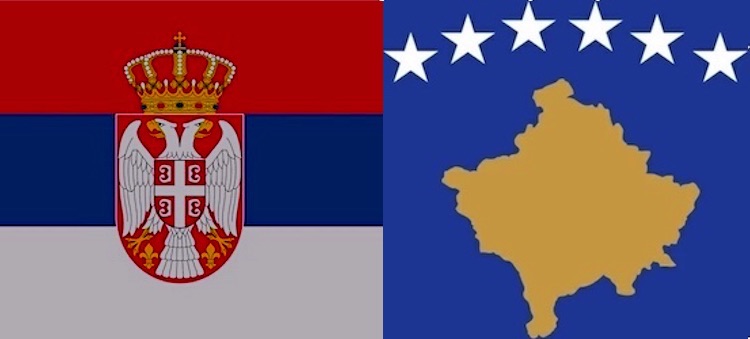Viewpoint by Aurora Weiss
The possibility of the Serbian president Vučić starting to play the role of the Balkan Vladimir Putin with an eventual invasion of Kosovo seems never to have been more serious.
VIENNA (IDN) — Escalation: it’s like lighting a match. Two separate components, Phosphorus and Match, can spark several times before the flame catches and finally lights up the fire. From the first, second or third attempt, it is only a matter of time before it starts burning.
The fact is that the conflicts in the Western Balkans have not abated in the last 30 years, and it is only a matter of time before the spark turns into a flame. In this regard, the sparking issue is particularly tense between Kosovo and Serbia. For the last few days, the security situation has been at a high risk of escalation.
On Sunday (July 31), after the Serbs blocked the roads to the border crossings with Serbia in the north of Kosovo, Jarinje and Brnjak, the Kosovo police announced that shots were heard in a few places, and some were directed at police units. No one was injured.
Tensions were triggered by Pristina’s decision to ban entry to citizens with Serbian documents from August 1 and issued them a three-month permit, the so-called “entry-exit document”, and to replace the vehicle registration plates issued in Serbia for cities in Kosovo with RSK marks.
These are reciprocal measures because, for 11 years, Serbia has not allowed the entry of citizens of Kosovo with Kosovo documents but provided them special permits.
Kosovo Prime Minister Albin Kurti claims that the reason for the outbreak of tensions is not because of the car whose license plate should be marked with RKS (Republic of Kosovo), but because of the old question “to whom does Kosovo belong?”. There is no definitive answer since the unilateral declaration of its independence (UDI) and separation from Serbia in 2008, under whose jurisdiction Kosovo had previously been for 100 years.
In the coming weeks, the situation is particularly risky, avers Kosovo President Vjusa Osmani. She points the finger and blames Vučić’s regime and his close relations with Russia. They have supported illegal structures in northern Kosovo in the last few months. Osmani claims that strategy lies in criminal gangs through which they continue to keep the Serbian minority in Kosovo as prisoners and destabilise the country.
After Washington’s diplomatic intervention and the call of the American ambassador Jeffrey M. Hovenier in Pristina, the Kosovo government announced that it would postpone the implementation of the decisions until September 1, with the condition that the blockades can be removed.
According to Belgrade media reporters, the barricades were removed on August 3 morning. Still, the Brnjak and Jarinje border crossings are not open, so Kosovo can only be entered via the Merdare crossing.
This was also assessed by NATO Mission KFOR. They stated that, in accordance with their mandate, they are ready to intervene if stability in Kosovo is threatened.
While the United States of America intervened for Pristina, Russia did it for Belgrade.
Moscow calls on Pristina, the United States and the European Union, who are backing it, to stop provocations and observe the rights of Serbs in Kosovo. Russian Foreign Ministry Spokeswoman Maria Zakharova stressed that such developments are another piece of evidence that the European Union’s mediatory mission has failed.
In the shadow of the war in Ukraine, which is enough for justified fears of its spill over to other critical points, such as the Western Balkan for quite a long time, grounding impressions emerge: The possibility of the Serbian president starting to play the role of the Balkan Vladimir Putin with an eventual invasion of Kosovo seems never to have been more serious.
There are no signs of the situation calming down until September 1. It will only create space for political propaganda and concrete preparations for more confrontations. Yes, it will escalate even more! The EU High Representative for Foreign Affairs and Security Policy are naive if they think they can solve further incidents by calling for a dialogue between the leaders of Kosovo and Serbia.
But let’s touch on other levels as well. Regarding what the Albanians and Serbs in the north of Kosovo think about the outbreak of war, there is an entirely different perspective than the one guided by political interest.
We spoke with a journalist Emirat Asipi who reports from Kosovo. Realistically, civilians do not want war because they know what consequences it leaves with their vivid memory from the 90s. Instead of war, people wish to better living conditions in the country. They believe politicians should focus more on this than on creating new conflicts. Bad economic situation, poor education and healthcare, and young people in search of perspective leaving the country—are just some of the problems that are bigger than the plates on cars.
One of the main reasons the locals are not afraid that war could outbreak is a realistic core. People are even ironic about it and say there is no one to go to war with. Namely, most of the male population was killed in the Yugoslavian war 27 years ago, and the young generation has moved abroad due to the bad economic situation in the country.
While politics is fighting its battle, journalists who mediate at several levels believe there is neither the manpower nor money for a new war in terms of arming.
Obviously, the citizens of the Western Balkan countries are only hostages of political leaders who redirect action of finding a solution for realistic problems into instrumentalised conflict with the old strategy of “divide and rule (divide et impera)”. [IDN-InDepthNews — 05 August 2022]
Image credit: IDN-INPS with Serbian and Kosovo flags from Wikimedia Commons.
is the flagship agency of the Non-profit International Press Syndicate.
This article is published under the Creative Commons Attribution 4.0 International licence. You are free to share, remix, tweak and build upon it non-commercially. Please give due credit.

